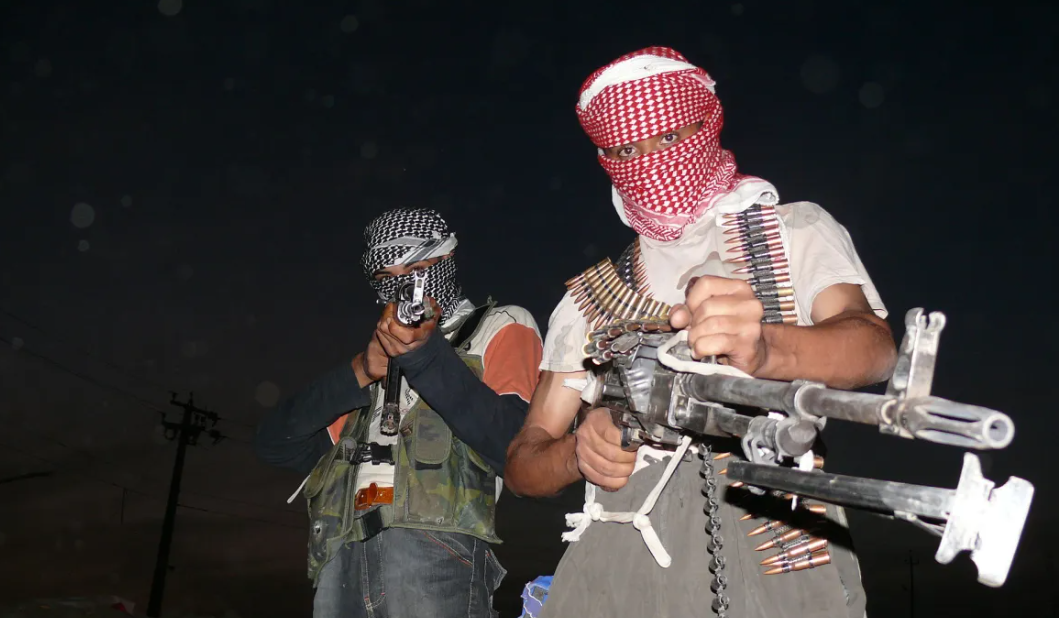Terror Groups in the Middle East: An In-Depth Analysis (GS Paper 3, Terrorism)

Introduction
- Recent military engagements, particularly Israel's actions against Hezbollah, have once again spotlighted the complex network of militant groups in the Middle East.
- Understanding these groups is essential for grasping the geopolitical intricacies and security challenges in the region.
Major Militant Groups
Hezbollah
- Overview: Hezbollah is a Shiite Muslim political party and militant organization based in Lebanon, formed in the early 1980s during the Lebanese Civil War. It operates as a "state within a state," wielding significant political and military power.
- Military Capabilities: The group maintains a highly organized military structure, including a well-equipped paramilitary wing known as the Jihad Council. This wing possesses advanced weaponry, such as precision-guided missiles and unmanned aerial vehicles, and is estimated to have tens of thousands of fighters.
- Objectives: Hezbollah's primary aims include opposing Israel and the United States, supporting the Syrian regime, and consolidating its influence within Lebanon. It has openly called for the elimination of Israel since its inception, often engaging in armed confrontations with Israeli forces.
- Global Standing: The United Nations and several countries classify Hezbollah as a terrorist organization due to its involvement in regional conflicts and acts of terrorism, including bombings and assassinations against Western and Israeli targets.
Badr Organization
- Overview: Originally formed as the Badr Brigades during the Iran-Iraq War, the Badr Organization is a Shia Islamist political party and paramilitary group in Iraq. It has strong ties to Iran and was initially created to oppose Saddam Hussein's regime.
- History: After the 2003 U.S.-led invasion, many Badr fighters joined the Iraqi military and police forces, gaining influence within Iraq’s security structure. The organization became a significant player in the fight against ISIS, contributing to the Popular Mobilization Forces (PMF).
- Current Role: Badr continues to operate as a key element in Iraq’s national security strategy, often accused of engaging in sectarian violence against Sunni populations.
- UN Standing: The UN regards the Badr Organization as a destabilizing force in Iraq, attributing to it a role in exacerbating sectarian tensions and undermining Iraq's governance.
Islamic State of Iraq and ash-Sham (ISIS)
- Overview: ISIS, also known as ISIL, is a Salafi-jihadist group that gained notoriety for its brutal methods and extensive territorial conquests in Iraq and Syria. It emerged from al-Qaida in Iraq and declared itself a caliphate in 2014.
- Background: The group was initially led by Abu Musab al-Zarqawi, who merged his network with al-Qaida. Following his death, Abu Bakr al-Baghdadi took over and expanded operations significantly, culminating in the capture of large territories.
- Current Status: Although international coalitions have expelled ISIS from most of its territory, it continues to conduct covert operations, focusing on guerrilla tactics, including bombings and ambushes against military and civilian targets.
- UN Standing: The UN has condemned ISIS for its widespread violence and the humanitarian crises it has caused, categorizing it as a significant global threat.
Boko Haram
- Overview: Boko Haram, active mainly in Nigeria, seeks to establish a Salafi-Islamist state free from Western influence. Founded in 2002, it has been responsible for severe violence and destabilization in the Lake Chad region.
- Impact: The group has been linked to over 50,000 deaths and the displacement of more than 2.5 million people. Its tactics include mass killings, kidnappings, and the use of suicide bombers.
- Current Affiliations: Initially affiliated with al-Qaida and later ISIS, Boko Haram now operates independently, with many members defecting to other groups or surrendering to authorities.
- UN Standing: Recognized as a terrorist organization, Boko Haram's actions have drawn widespread condemnation for their brutality and impact on regional stability.
Kurdistan Workers' Party (PKK)
- Overview: Founded in 1978, the PKK is a militant Kurdish separatist group that aims to establish an independent Kurdistan spanning Turkey, Iraq, Syria, and Iran. The organization has historically pursued a Marxist-Leninist ideology.
- Methods: The PKK employs guerrilla warfare tactics and has used various weapons, including improvised explosive devices (IEDs), car bombs, and small arms, primarily targeting Turkish military and police forces.
- Geographic Influence: The PKK primarily operates in northern Iraq and southeastern Turkey, where it has established bases. Its activities have also extended into northern Syria and Iran.
- UN Perspective: The UN has included the PKK in broader counter-terrorism discussions, recognizing its militant activities and their implications for regional security, particularly concerning Turkey.
Conclusion
- The militant groups operating in the Middle East, such as Hezbollah, the Badr Organization, ISIS, Boko Haram, and the PKK, represent diverse ideologies and objectives.
- Their activities significantly influence regional stability, security dynamics, and international relations.
- Understanding these groups is crucial for formulating effective foreign policies and responses to ongoing conflicts in the Middle East.
- As global and regional powers navigate these complex landscapes, the implications of these groups’ actions will continue to resonate far beyond their immediate territories.


